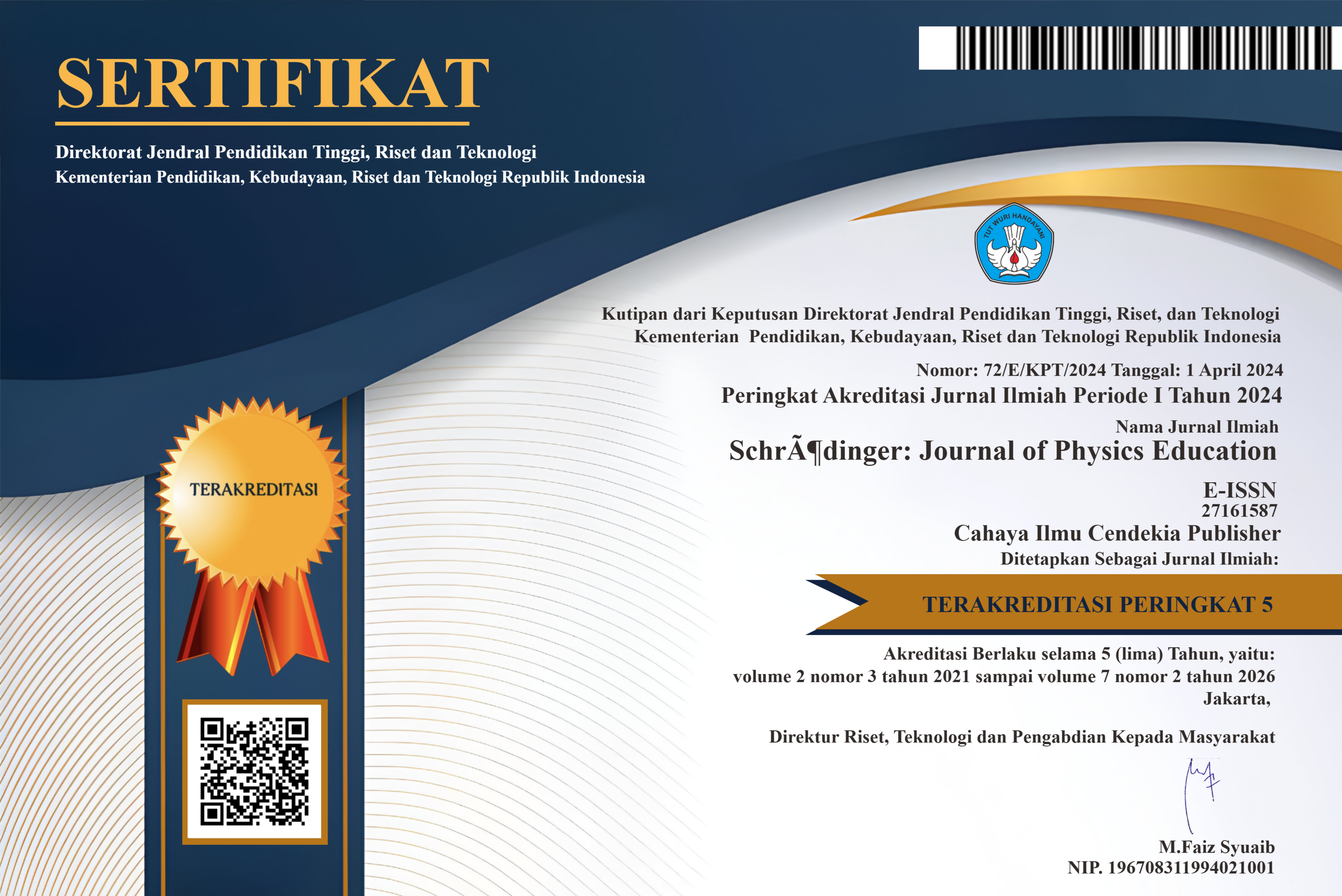Development of Online Learning Management in Physics Learning Technology Course
Abstract
Purpose of the study: Development of online learning management in Physics Learning Technology course.
Methodology: The research method used is the development research method with the research subjects of students of the Department of Physics Education, Faculty of Teacher Training and Education, Sebelas Maret University, Surakarta, Indonesia. Data were collected using an open questionnaire method and analyzed using a method of concluding from the opinions expressed by students participating in the course.
Main Findings: The development of an online learning management model for the Physics Learning Technology course in the Physics Education Study Program at Sebelas Maret University was carried out through the stages of planning, organizing, implementing, and supervising to achieve learning objectives. Planning involved preparing a blended learning-based course syllabus. Organizing included arranging the necessary materials, media, and learning tools. Implementation followed the planning and organizing stages, while supervision was conducted by analyzing student responses. The results show that all seven learning objectives were achieved, including the ability to collaborate, manage time, use online learning applications, select appropriate materials, complete assignments on time, rewrite information from library sources, and properly cite references.
Novelty/Originality of this study: Online learning management of Physics Learning Technology course can be done by learning of designing, organizing, actuating, and controlling according to learning objectives.
References
G. R. Terry and L. W. Rue, Dasar-dasar Manajemen Edisi Revisi [Management Fundamentals Revised Edition]. 2019.
N. Nurhikmah, “Educational management functions: planning, organizing, actuating, controlling,” INTIHA Islam. Educ. J., vol. 1, no. 2, pp. 82–91, Jun. 2024, doi: 10.58988/intiha.v1i2.293.
E. Sianturi, "Manajemen festival musik kampus virtual di IAKN Manado [Virtual campus music festival management at IAKN Manado]," Clef: Jurnal Musik dan Pendidikan Musik, vol. 1, no. 2, 2020, doi: 10.51667/cjmpm.v1i2.344.
D. Hartono, H. Aliyah, O. Safitri, and O. Ciputri, “The implementation of the management planning, organizing, actuating, controlling in BES PPJA (Case Study of The Santri Executive Board of The Jagad ‘Alimussirry),” J. Intellect. Sufism Res., vol. 6, no. 1, pp. 12–28, 2023, doi: 10.52032/jisr.v6i1.156.
A. Lee, J. Y. Lee, and E. Jung, “University students’ experience of online space while engaging in synchronous learning via videoconferencing amidst the pandemic,” Front. Psychol., vol. 14, no. January, pp. 1–11, 2023, doi: 10.3389/fpsyg.2023.1083754.
E. S. Belt and P. R. Lowenthal, “Synchronous video-based communication and online learning: an exploration of instructors’ perceptions and experiences,” Educ. Inf. Technol., vol. 28, no. 5, pp. 4941–4964, 2023, doi: 10.1007/s10639-022-11360-6.
E. Purwandari and A. H. Prasetyo, “Students’ perceptions of online learning based on synchronous and asynchronous learning,” AIP Conf. Proc., vol. 2736, no. 1, p. 160004, Sep. 2023, doi: 10.1063/5.0170881.
J. Han, D. Daniela K., and E. L. and Usher, “College students’ self-regulation in asynchronous online courses during covid-19,” Stud. High. Educ., vol. 48, no. 9, pp. 1440–1454, Sep. 2023, doi: 10.1080/03075079.2023.2201608.
Q. Wang, Y. Wen, and C. L. Quek, “Engaging learners in synchronous online learning,” Educ. Inf. Technol., vol. 28, no. 4, pp. 4429–4452, 2023, doi: 10.1007/s10639-022-11393-x.
T. C. Varkey et al., “Asynchronous learning: a general review of best practices for the 21st century,” J. Res. Innov. Teach. Learn., vol. 16, no. 1, pp. 4–16, 2023, doi: 10.1108/JRIT-06-2022-0036.
M. M. E. I. Bali, M. P. Kumalasani, and D. Yunilasari, “Artificial intelligence in higher education: perspicacity relation between educators and students,” Journal of Innovation in Educational and Cultural Research, vol. 3, no. 2, 2022, doi: 10.46843/jiecr.v3i2.88.
L. Moustakas and D. Robrade, “The challenges and realities of e-learning during covid-19: the case of university sport and physical education,” Challenges, vol. 13, no. 1, p. 9, 2022, doi: 10.3390/challe13010009.
S. Fabriz, J. Mendzheritskaya, and S. Stehle, “Impact of synchronous and asynchronous settings of online teaching and learning in higher education on students’ learning experience during covid-19,” Front. Psychol., vol. 12, no. October, 2021, doi: 10.3389/fpsyg.2021.733554.
C. J. Fernandez, R. Ramesh, and A. S. R. Manivannan, “Synchronous learning and asynchronous learning during covid-19 pandemic: a case study in India,” Asian Assoc. Open Univ. J., vol. 17, no. 1, pp. 1–14, 2022, doi: 10.1108/AAOUJ-02-2021-0027.
R. Kango and S. Ghozi, “Tantangan pembelajaran e-learning di perguruan tinggi [Challenges of e-learning in higher education],” in Seminar Nasional Teknologi, Sains dan Humaniora 2019 (SemanTECH 2019), 2019.
R. Nastiti and N. Hayati, “Pembelajaran daring pada pendidikan tinggi: tantangan bagi mahasiswa dan dosen di tengah pandemi [Online learning in higher education: challenges for students and lecturers amidst the pandemic],” INOBIS: Jurnal Inovasi Bisnis dan Manajemen Indonesia, vol. 3, no. 3, 2020, doi: 10.31842/jurnalinobis.v3i3.145.
K. H. Primayana, “Implementasi manajemen pembelajaran daring berbantuan platform kahoot terhadap kepuasan mahasiswa [Implementation of online learning management assisted by the Kahoot platform on student satisfaction],” Edukasi: Jurnal Pendidikan Dasar, vol. 2, no. 1, 2021, doi: 10.55115/edukasi.v2i1.1392.
N. Arifin, “Manajemen inovasi pembelajaran di perguruan tinggi [Learning innovation management in higher education],” JUMPA : Jurnal Manajemen Pendidikan, vol. 1, no. 2, 2020, doi: 10.33650/jumpa.v1i2.2111.
F. Dwi Widayanti et al., “Manajemen pembelajaran berbasis e-learning pada perguruan tinggi [E-learning based learning management in higher education],” Konstruktivisme, vol. 16, no. 1, pp. 64-82, 2024, doi: 10.35457/konstruk.v16i1.3016
N. Herlina, “Manajemen pembelajaran daring di perguruan tinggi pada masa pandemi covid-19 [Online learning management in higher education during the Covid-19 pandemic],” Journal Civics & Social Studies, vol. 4, no. 2, 2020, doi: 10.31980/civicos.v4i2.925.
Suyono, “Manajemen pembelajaran berbasis daring dalam rangka memutus mata rantai penularan covid-19 di perguruan tinggi swasta lembaga layanan pendidikan tinggi (LLDIKTI) wilayah VII [Online learning management in order to break the chain of transmission of Covid-19 in private higher education institutions (LLDIKTI) in Region VII],” Ed-Humanistics : Jurnal Ilmu Pendidikan, vol. 5, no. 1, 2020, doi: 10.33752/ed-humanistics.v5i1.708.
S. Setiono, “Analisis respon mahasiswa dalam pembelajaran online berbasis aktifitas di perguruan tinggi [Analysis of student responses in activity-based online learning in higher education],” Jurnal Pendidikan, vol. 9, no. 2, 2021, doi: 10.36232/pendidikan.v9i2.1095.
A. Asrani and M. Annisa, “Analisis proses pembelajaran daring mahasiswa PGSD selama pandemi covid 19 [Analysis of the online learning process of PGSD students during the Covid-19 pandemic],” Jurnal Basicedu, vol. 6, no. 2, 2022, doi: 10.31004/basicedu.v6i2.2570.
N. L. Khusniyah and L. Hakim, “Efektivitas pembelajaran berbasis daring: sebuah bukti pada pembelajaran bahasa inggris [Effectiveness of online learning: an evidence on English language learning],” Jurnal Tatsqif, vol. 17, no. 1, 2019, doi: 10.20414/jtq.v17i1.667.
A. Damayanthi, “Efektivitas pembelajaran daring di masa pandemi covid-19 pada perguruan tinggi keagamaan katolik [The effectiveness of online learning during the Covid-19 pandemic at Catholic religious colleges],” Edutech, vol. 19, no. 3, 2020, doi: 10.17509/e.v1i3.26978.
R. Abdillah, A. C. W. Nugraha, and B. Sarasati, “Efektivitas pembelajaran daring mata kuliah metodologi penelitian kualitatif pada mahasiswa [The effectiveness of online learning of qualitative research methodology courses for students],” Jurnal Basicedu, vol. 6, no. 1, 2021, doi: 10.31004/basicedu.v6i1.1915.
J. Silvanus and R. Ridwan, “Efektivitas pembelajaran praktikum dengan google sites berbantuan quizstar untuk meningkatkan kemampuan berpikir kreatif mahasiswa era covid-19 [The effectiveness of practical learning with Google Sites assisted by Quizstar to improve students' creative thinking skills in the Covid-19 era],” Jurnal Teknologi Pendidikan, vol. 11, no. 2, 2022, doi: 10.32832/tek.pend.v11i2.6118.
L. Dewi, “Rancangan program pembelajaran daring di perguruan tinggi: studi kasus pada mata kuliah kurikulum pem-belajaran di Universitas Pendidikan Indonesia [Design of online learning programs in higher education: a case study on the curriculum of learning courses at the Indonesian University of Education],” EDUTECH, vol. 16, no. 2, 2017, doi: 10.17509/e.v16i2.7616.
H. S. Hadijah, S. Suwatno, A. Adman, and F. J. Islamy, “Tingkat kreativitas mahasiswa, demotivasi, disembodied behaviors dan efektivitas komunikasi melalui video conference pada era pandemi covid-19 [Level of student creativity, demotivation, disembodied behaviors and effectiveness of communication via video conference in the era of the covid-19 pandemic,” Jurnal MANAJERIAL, vol. 20, no. 2, 2021, doi: 10.17509/manajerial.v20i2.41248.
Plomp & Nienke, “Introduction to Educational Design Research: An Introduction,” Educational Design Research, 2013.
M. A. Firdaus, M. Mawardi, and O. Suryani, “Development of teaching material based on plomp development model to support merdeka curriculum on global warming topic,” J. Pijar Mipa, vol. 18, no. 4, pp. 537–545, 2023, doi: 10.29303/jpm.v18i4.5286.
Copyright (c) 2025 Daru Wahyuningsih, Sukarmin Sukarmin

This work is licensed under a Creative Commons Attribution 4.0 International License.
Authors who publish with this journal agree to the following terms:
- Authors retain copyright and acknowledge that the Schrödinger: Journal of Physics Education is the first publisher licensed under a Creative Commons Attribution 4.0 International License.
- Authors are able to enter into separate, additional contractual arrangements for the non-exclusive distribution of the journal's published version of the work (e.g., post it to an institutional repository or publish it in a book), with an acknowledgment of its initial publication in this journal.
- Authors are permitted and encouraged to post their work online (e.g., in institutional repositories or on their website) prior to and during the submission process, as it can lead to productive exchanges and earlier and greater citation of published work.







.png)
.png)








.png)
.png)
.png)







